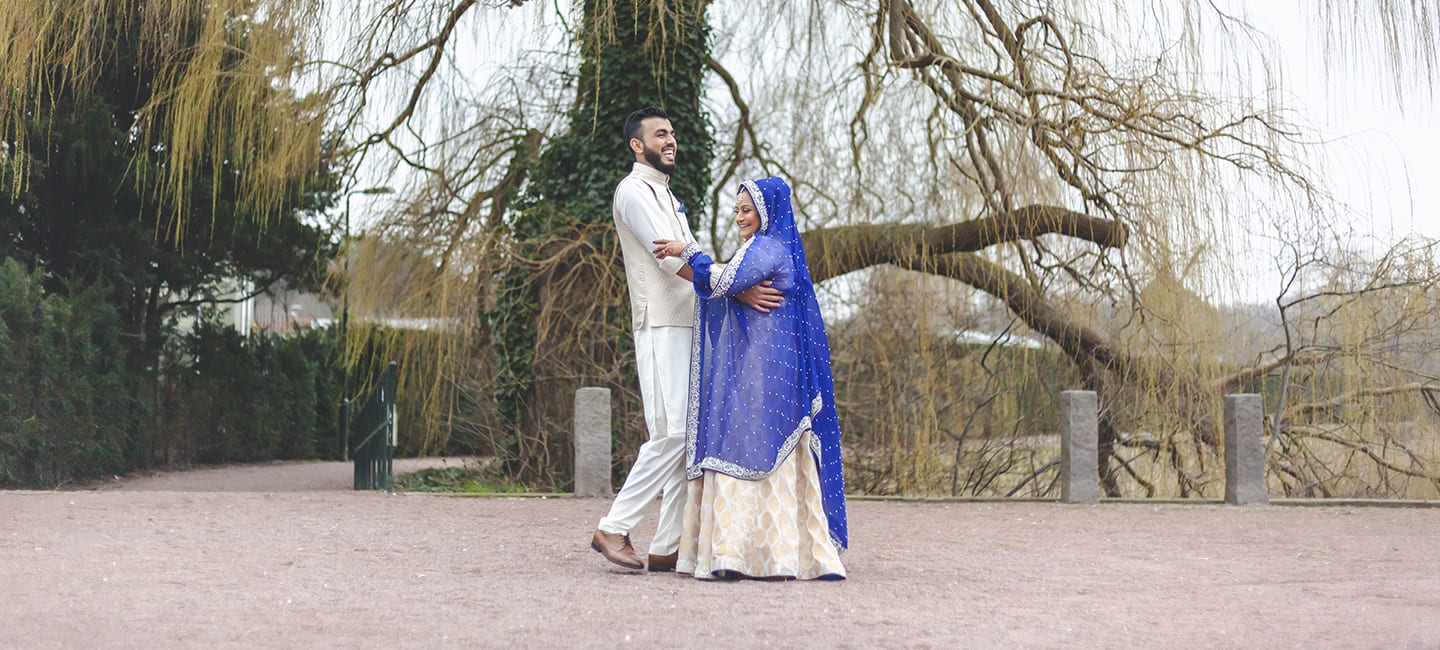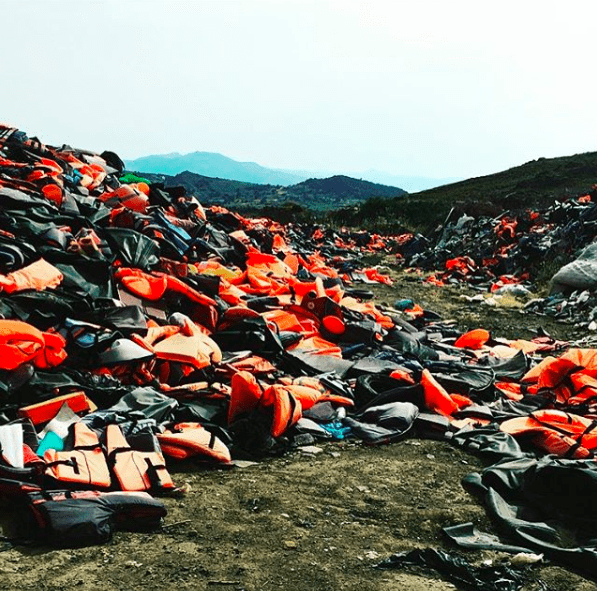
Para una profesora de Chicago, la prohibición de viajar de Trump ha supuesto vivir a un continente de distancia de su marido sirio.
Arriba: Rezan Al Ibrahim y Aysha Shedbalkar fotografiados el día de su boda, el 22 de marzo de 2019 en Malmo, Suecia. Foto cortesía de Sairah Camilla Fotografía.
El mes que viene, Aysha Shedbalkar y Rezan Al Ibrahim celebrarán su primer aniversario de boda. Pero la pareja no podrá celebrarlo en Lombard, el suburbio de Chicago donde vive Shedbalkar, ni en Northlake, donde ella trabaja como profesora de matemáticas de secundaria desde hace casi 20 años.
En Prohibición de viajar del presidente Donald TrumpEl marido de Shedbalkar, refugiado sirio, no puede vivir con ella en Estados Unidos, ni siquiera visitarla. Tampoco está claro cuándo podrá venir, si es que alguna vez lo hace.
Desde enero de 2017, el presidente Trump ha emitido una serie de órdenes ejecutivas y proclamaciones presidenciales para restringir la entrada a Estados Unidos de ciudadanos de más de una docena de países. El mes pasado, Trump anunció la última ampliación de la prohibición para incluir a los ciudadanos que soliciten determinados visados de Eritrea, Kirguistán, Myanmar, Nigeria, Sudán y Tanzania. Se espera que la ampliación entre en vigor a finales de esta semana.
Para comprender mejor la prohibición y sus repercusiones en los ciudadanos estadounidenses durante los últimos tres años, Borderless Magazine habló con Shedbalkar sobre sus propias experiencias.
Además de profesora, Shedbalkar es voluntaria internacional desde hace mucho tiempo. Tras realizar un viaje de servicio de dos meses en 2007 para trabajar en un orfanato de Tanzania, Shedbalkar fue voluntaria con niños en Etiopía, India, Indonesia y Grecia.
En 2016, Shedbalkar se sintió conmovido por la historia de Alan Kurdi, un niño sirio de tres años que se ahogó al intentar cruzar el mar Egeo en una barca hinchable. Su familia había escapado de Siria e intentaba viajar de Bodrum (Turquía) a la isla de Kos (Grecia).
Shedbalkar decidió pasar sus vacaciones de verano como voluntaria en el Campo de refugiados de Oreokastro cerca de Salónica, en Grecia. El campamento albergaba a 1.500 refugiados, en su mayoría sirios. Había serpientes, no había agua corriente y sólo había unos 40 retretes portátiles para todo el campamento.
Allí encontró el amor.

Rezan Al Ibrahim y Aysha Shedbalkar fotografiados el día de su boda, el 22 de marzo de 2019 en Malmo, Suecia. Foto cortesía de Sairah Camilla Fotografía.
Aysha Shedbalkar
Como voluntarios, intentábamos cubrir las heridas de bala con tiritas. No podíamos ni de lejos arreglar lo que había que arreglar, pero lo intentamos lo mejor que pudimos con lo que teníamos a nuestra disposición.
Mi trabajo consistía en distribuir alimentos y ropa. A veces llevaba a la gente a sus citas médicas fuera del campo o iba al almacén a recoger donativos como pañales y leche maternizada. Muchas mujeres habían perdido la capacidad de amamantar debido al trauma y a la falta de nutrición.
El campamento era muy, muy estrecho, con tiendas por todas partes. Un día estalló una pelea entre dos grupos de personas y empezaron a sacar palos de las tiendas y a golpearse con ellos.
En ese momento, estaba visitando a un bebé y a su madre. Cuando oímos la pelea fuera, cogí al bebé, su madre cogió pasaportes y documentos importantes, y corrimos a otra sección del campo. Cerraron las puertas que dividían el campo detrás de nosotros para que la pelea no se extendiera al resto del campo. Con más de mil personas, lo último que quieres es que todo el campamento se llene de caos.
Rezan vivía en el campo con su familia, pero también trabajaba como traductor voluntario, ayudando a voluntarios como yo o interpretando para otros refugiados. Cuando tenía tiempo libre, entrevistaba a los refugiados y escribía su historia para compartirla en Facebook y Instagram para concienciar sobre lo que ocurría en los campos. Y muchas veces, Rezan era quien me traducía. Así nos conocimos. Empezamos a trabajar juntos todos los días y al final del día me decía: "Ven a cenar con mi familia".
Y siempre le digo: "Me enamoré de tu familia antes que de ti".
Su familia era probablemente la gente más dulce del campamento.
Rezan es mitad kurdo y mitad sirio, y nació y creció en Siria. Cuando empezó la guerra, su familia se marchó enseguida a Turquía. Su padre y su hermana se fueron a Suecia, mientras que Rezan se quedó con su madre y sus tres hermanos hasta que su padre pudo ir a buscarlos.
Al cabo de un año, el padre de Rezan envió al resto de la familia a reunirse con él en Suecia. Rezan no quería ir. Le gustaba Turquía. Pero su madre le pidió que les acompañara en el viaje y así podría volver a su vida en Turquía.
El viaje debía durar 10 días. Pero debido a la crisis de los refugiados, la gente inundaba Europa en ese momento y Macedonia había construido una valla en su frontera con Grecia. Había tropas allí 24 horas al día, 7 días a la semana, para asegurarse de que nadie pudiera pasar.
Al principio dejaban pasar a 50 personas al día. Luego bajaron a 10 y después a cinco. Llegó un momento en que nadie podía salir. Así que lo que se suponía que iba a ser un viaje de 10 días se convirtió en un calvario de tres meses. Rezan y su familia quedaron atrapados en Idomeni, el mayor campo de refugiados al aire libre desde la Segunda Guerra Mundial.
Era pleno invierno y la gente tenía frío y estaba frustrada. Grandes familias vivían en tiendas de campaña para una sola persona. Estaban sufriendo mucho y la gente estaba muy, muy disgustada. En un momento dado, en primavera, los refugiados intentaron derribar la valla fronteriza y las tropas macedonias respondieron disparándoles gases lacrimógenos y balas de goma.
Después de eso, el gobierno decidió disolver Idomeni y poner a todo el mundo en diferentes campos. Así fue como Rezan y su familia llegaron al campo de Oreokastro, en Grecia. Acabaron quedándose allí un año entero.

Chalecos salvavidas desechados en Molyvos, en la isla griega de Lesbos, en verano de 2016. Lesbos fue el principal punto de entrada a Europa de cientos de miles de refugiados sirios. Fotografía cortesía de Aysha Shedbalkar.
Rezan siempre dice: "Ni siquiera quería irme de Turquía". Pero yo le digo: "Menos mal que tu madre te obligó a llevártelos, porque si no hubieras hecho ese viaje, nunca nos habríamos conocido".
Pasamos todo el verano de 2016 trabajando juntos. Cuando volví a Chicago, chateábamos por vídeo todas las semanas para ver cómo les iba. Volví al campo en mis vacaciones de invierno para ver a Rezan y poco después su familia recibió un apartamento en Grecia.
En el verano de 2017, las Naciones Unidas aprobaron finalmente su reunificación familiar. A la madre y los hermanos pequeños de Rezan se les permitió ir a Suecia para estar con su padre y su hermana. Pero como Rezan tenía más de 18 años, la ONU podía colocarlo en cualquier lugar. Lo enviaron a Holanda. A propósito, no colocan a los refugiados con sus familias si eres mayor, porque no quieren que la gente espere ir automáticamente a los países donde viven sus familias.
Así que Rezan vivió en un campo de refugiados en Holanda durante algún tiempo y luego le dieron un apartamento en Ámsterdam y ahí es donde está hoy.
Estoy muy orgullosa de él. Está realmente decidido a reconducir su vida. Aprendió turco cuando vivía en Turquía y ahora ha aprendido neerlandés. En los Países Bajos fue a una escuela de programación y ahora es desarrollador junior. Me alegro de que ahora pueda soñar con el futuro, porque durante mucho tiempo no supo si había un futuro para él.
Rezan y yo nos comprometimos en 2017. Solicitamos un visado de prometido para que viniera a Estados Unidos, pero no dejábamos de oír hablar de personas que estaban en suspensión administrativa debido a la prohibición de viajar. Decidimos esperar a ver qué decidía el Tribunal Supremo. Teníamos fe en que el Tribunal Supremo revocaría la prohibición de viajar.
El día de la decisión, en junio de 2018, estaba con dos de mis amigos y Rezan. Estábamos dejando a mi mejor amiga Sarah en el aeropuerto, hablando y riendo en el coche. Recibí una notificación en mi teléfono diciendo que la Supremo se había pronunciado sobre la prohibición y que se habían puesto del lado de Trump. No dije nada, sólo empecé a llorar. Todos pensaron que lloraba porque Sarah se iba. Cuando les conté la decisión, todos nos sentamos en el coche en silencio. Fue devastador.
Llevábamos casi un año y medio prometidos. Nuestro objetivo siempre fue comprometernos y luego casarnos en Estados Unidos y tramitar el visado de prometido. Pero cuando se produjo la decisión del Tribunal Supremo, decidimos que no íbamos a esperar más. Decidimos casarnos y solicitar el visado de cónyuge.
Nos casamos el 22 de marzo de 2019. Fueron mis vacaciones de primavera. Estuve con él 10 días y luego tuve que volver a Chicago. Voy a verlo cada vez que tengo un descanso, incluso en un fin de semana de tres días. Tomo un vuelo de ocho horas a Ámsterdam, me quedo allí el sábado y el domingo y vuelvo el lunes. Es muy, muy difícil, pero merece la pena porque si no le veo una vez cada uno o dos meses, siento que me vuelvo loca.
Durante mucho tiempo tuve mucho miedo de hablar de mi situación. Decidí que es más importante denunciar algo que está mal que callarse. Creo que muchas veces la gente de color no habla porque tiene miedo de lo que pueda pasar. Creo que la representación importa. Creo que nuestras historias importan. Cuando hablamos claro, puede que alguien se dé cuenta y se una a nosotros en la lucha contra estas injusticias.
Sé que al final estaremos juntos. Si tengo que mudarme, lo haré. Mi esperanza es que todo salga bien y Rezan pueda venir aquí. Cada sueño que tengo es que él esté aquí conmigo.
Borderless Magazine es su fuente de historias que trascienden fronteras. Usted puede apoye nuestro trabajo con una donación libre de impuestos hoy mismo.
Donar